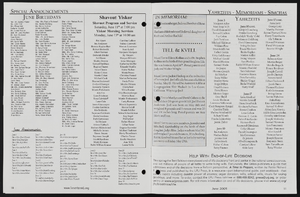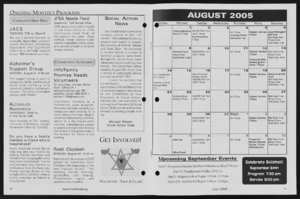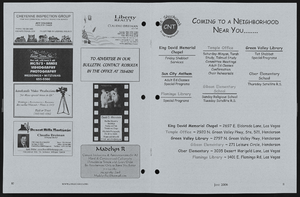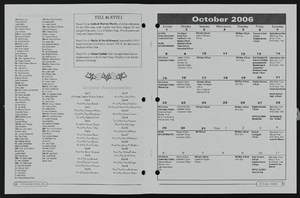Search the Special Collections and Archives Portal
Search Results

Mary Leo interview, February 27, 1980: transcript
Date
Archival Collection
Description
On February 27, 1980, Rafael Reyes-Spindola interviewed Mary Leo (b. Mary Susanne Kaime Leo in 1949 in Santa Barbara, California) about her life growing up in the Las Vegas Valley and her varied career path. Leo, having moved to Las Vegas as a toddler, talks about what the city was like when she arrived, the landscape, schooling and local life in general. She remembers the construction of the University of Las Vegas, Nevada and the growth of the city and population. Through her anecdotes, Leo shares the local attitude towards the Strip that Las Vegans develop as a result of being raised in the city and focuses the beginning half of her interview on life outside of the Strip. The interviewer and Leo move their conversation towards her career path, beginning in a coffee shop at the Riviera Hotel & Casino, her time in the travel industry, as a Las Vegas showgirl in the famed Folies Bergere show, her return to the Riviera as the director of sales and catering, and the legacy she hopes to leave behind with her career.
Text

Transcript of interview with Cheryl Leonard by Claytee White, February 12, 2013
Date
Archival Collection
Description
First arriving in Las Vegas as an infant, Cheryl Leonard's young life included a brief sojourn in Southern California before returning to Las Vegas in 1954. After attending local elementary and middle schools, she started at Rancho High during the day, and working at the Huntridge theater in the evenings and during the summers. More than just work, though - in this interview, Cheryl recalls school activities from parades to pep club, participating in Helldorado, hanging out with her friends at the Blue Onion and shopping on Fremont Street. After graduation, Cheryl returned to California to attend school before coming back to Las Vegas and taking a job with the Central Telephone Company. This was followed by a brief stint working at the Nevada Test Site before she married in 1964 and concentrated on raising her own daughters in a rapidly growing and changing Las Vegas.
Text

Transcript of interview with Jack Levine by Suzanne Becker, June 28, 2007
Date
Archival Collection
Description
Jack LeVine offers a narrative as a real estate agent and a gay man who has lived in Las Vegas since he was a young adult in the 1980s. He first started visiting Las Vegas whenever his truck driver routes allowed him to visit his parents who had moved here in 1977. They owned a downtown sandwich and catering business called Your Place or Mine. Then in 1985 Jack and his life-partner, J.J., decided to relocate to Las Vegas. Jack soon launched a real estate career that began with the purchase of a 13-unit apartment complex. Over the years he became knowledgeable about the history of the greater community and the individual neighborhoods; including John S. Park—"the earliest suburb in Las Vegas. Jack and J.J have lived in a 1954 Mid-Century Modern home since the mid-1990s. Jack is a strong believer in re-gentrification and mentions other cities where this has been successful. His philosophy includes an explanation of the sense of community that is derived from those who invest of themselves in that community life John S. Park.
Text
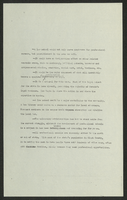
University of Nevada, Las Vegas law school: questionnaire, press releases, meeting minutes, newspaper clippings
Date
Archival Collection
Description
Folder contains: law school questionnaire and responses, 1973; press release about a statewide advisory board charged with developing preliminary plans for a law school at UNLV, June 20, 1973; Minutes of the Joint Senate-Assembly Education Committee Meeting for a Law School, March 16, 1973; press releases about donations; notes; and newspaper clippings. From the University of Nevada, Las Vegas William S. Boyd School of Law Records (UA-00048).
Text

Transcript of interview with Elizabeth "Betty" Krolak by Irene Rostine, September 26, 1995
Date
Archival Collection
Description
In 1962, Elizabeth “Betty” Krolak moved from the Midwest to Las Vegas with her husband and six children. Not only would the drier desert climate benefit her youngest daughter’s health due to asthma, but the family hoped the Las Vegas economy would be beneficial for their future. Prior to her arrival in Las Vegas, Betty worked briefly as a secretary for the New York Central Railroad before becoming a stay-at-home mom and active member of the PTA. Upon their arrival in Las Vegas, Betty’s husband enrolled in a real estate class, but was unable to complete the program. Betty, not wanting to waste the $80 they had spent on the class, decided to attend in his place. This decision led to life changing events for Betty and her family over the next four decades. After taking the real estate class and passing the test, Betty became a licensed Nevada real estate broker in October of 1963. She initially went to work for Pyramid Realty and, in 1964, she opened her own office, Clark County Realty. After her divorce in 1967, Betty was left with “six hungry children” to feed and no child support or health insurance. She recalls how the benefits of being in real estate really became apparent during this period of her life. While real estate required long hours seven days a week, it also afforded a single mother flexibility that other careers would not have offered. Likewise, a woman could make more money in real estate in the 1960s and 1970s than most other careers provided, which was particularly important for Betty who was committed to raising her children without public assistance. Betty’s oral history chronicles the growth of the Las Vegas Board of Realtors which has grown into what today is the Greater Las Vegas Association of Realtors (GLVAR). She recalls how, in the 1960s, meetings took place in bowling allies and the primary role of the GLVAR was to provide networking opportunities and represent the Code of Ethics for realtors. However, the Board was dominated by males, with the role of women members confined to planning social events and arranging for refreshments. In 1968, Betty and several other women realtors set out to change this by initially establishing a local Women’s Council within the Board. In the years following, Betty became the first women to be an Executive Board Member. Today, more than half the members of the Executive Board are women. Betty’s oral history also speaks to many changes within the real estate industry over the past four decades, some positive and some not so positive. She recounts the 1960s to the 1980s, when casino workers’ main source of income came from tips which were often unreported, creating challenges in getting casino workers qualified for home loans because they did not have the ability to document their source of income. Likewise, single women had a hard time qualifying for home loans because they only had one income and, in those days, it rarely was enough to qualify for a mortgage on their own. Also during this period, realtors primarily focused on the resale market because builders wanted to work directly with buyers, but changes in the real estate market eventually led builders to realize the benefits of allowing realtors to sell new houses, too. During her career, Betty also experienced the rise of real estate franchises, beginning with Century 21’s arrival in Nevada, the development of Multiple Listing Service (MLS), changes to educational requirements, approaches to settling disputes, and new approaches to ethics violations. Perhaps the biggest change Betty’s oral history speaks to is the personal approach to selling real estate that has been lost over time. In the early days, brokers sold houses right alongside the sales agents. Today, however, regulations have placed brokers in a position where their primary role is to manage sales people, not sell houses. Also, realtors used to interact with other realtors, title company personnel, and mortgage lenders before technology, such as fax machines and computers, came along. In the early days, documents were transferred in person allowing people in the industry to get to know one another through these personal interactions. Today, everything is done electronically and it is rare to actually know the person on the other end. Selling real estate has lost a lot of its personal touch, according to Betty. In addition to being the mother of six children and running one of the largest real estate offices in the area, Betty also found time to give back to the community through her volunteer work with the Salvation Army. She was instrumental in establishing Southern Nevada’s Angel Tree project, which provides Christmas presents to children who otherwise would not receive them. She was also appointed by Governor Michael O’Callahan to the State of Nevada’s Real Estate Commission, making her the first woman to serve on the Commission. Betty’s career in real estate allowed her to witness and implement many changes that still impact the industry today. When Betty began her career, Las Vegas’ population was just over 45 thousand. By the mid-1990s Green Valley, Spring Valley, North Las Vegas, Summerlin, and Sun City had been developed and the Valley’s population exceeded 1 million people. Betty Krolak’s career merged with the real estate boom as she helped find homes for those who wanted to make Las Vegas their home. She made sure the real estate industry’s growth included women, training mechanisms, and ethics which continue to benefit realtors, home buyers, and home sellers to this day.
Text

Mauricia Baca oral history interview: transcript
Date
Archival Collection
Description
Oral history interview with Mauricia Baca conducted by Claytee D. White on March 7, 2019 for the Remembering 1 October Oral History Project. Mauricia Baca discusses her early life, her education, and her experiences living in New York City, New York before she moved to Las Vegas, Nevada. She also relates her experiences on and after the 1 October mass shooting. Baca relates information on her agency, Get Outdoors Nevada. Baca shares how her agency worked with the City of Las Vegas in the construction and operation of the Healing Garden. Finally, she discusses the book she helped author regarding 1 October.
Text

